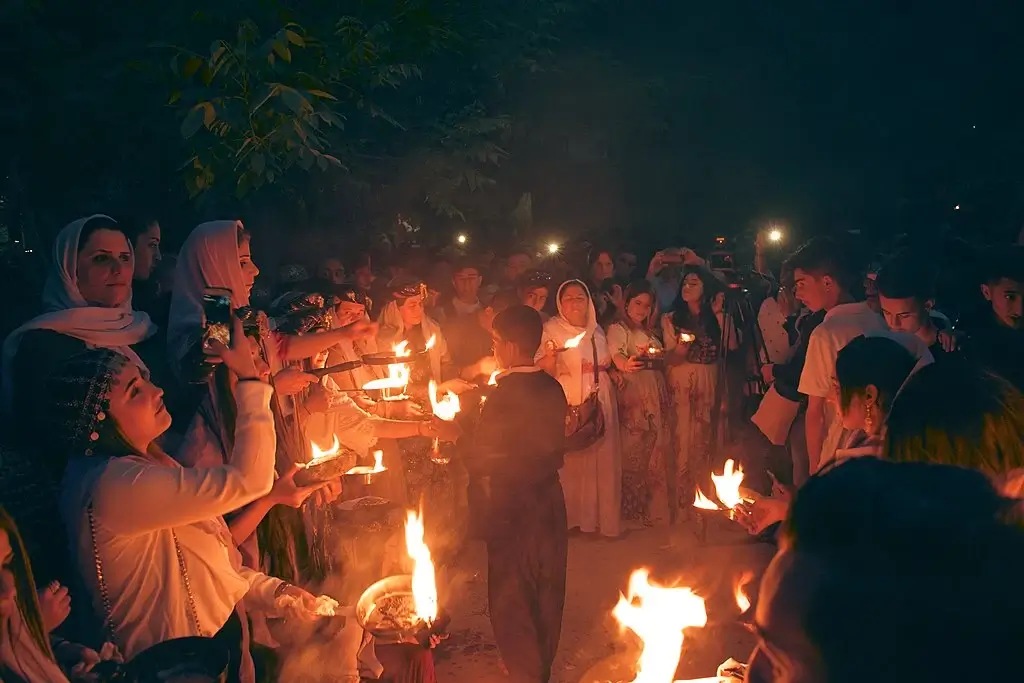Christianity, Islam, and Hinduism each have more than 1 billion followers, and there are several other well-known religions like Buddhism, Judaism, Zoroastrianism, the Bahá’í Faith, and Sikhism. However, numerous lesser-known religions also exist globally, with some predating 5000 years. In this blog post, we’ll explore seven unique and lesser-known religions of the world.

Mami Wata
Mami Wata is an African-originated religion that centers around the veneration of a water spirit known as Mami Wata. This spiritual figure is often portrayed as an extraordinarily beautiful entity with long, flowing hair, and is frequently depicted with a large serpent.
Followers of the Mami Wata religion believe that this deity may take on human form and appear in places like bars or bustling markets. Additionally, she is said to occasionally abduct individuals while they are swimming or boating on the water. These captives are later released, typically in improved health and dry clothes, but they must agree to an oath of sexual fidelity to Mami Wata as part of the ritual.
Originally rooted in Africa, the worship of Mami Wata has expanded to encompass various Caribbean islands, as well as parts of North and South America. This syncretic faith has blended indigenous beliefs with elements of Christianity and other local traditions.
Druze Faith
The Druze faith is an ethnoreligious belief system primarily practiced in Syria, Lebanon, and Israel, with approximately one million adherents worldwide. This faith is a unique millenarian offshoot of Isma’ili Shi’ism. Druze followers emphasize Abrahamic monotheism but consider their religion distinct from Islam.
The Druze derive their name from Muhammad al-Darazi, an Isma’ili missionary from Persia who resided in Fatimid Cairo. Al-Hakim ibn Amr Allah, the sixth caliph of Egypt’s Isma’ili Fatimid Dynasty. established a new faith in which he was regarded as the incarnation of God. Druze anticipated al-Hakim’s return to bring about justice and global peace.
Druze’s theology includes belief in reincarnation, five divine messengers, recognition of Abrahamic prophets such as Jesus and Muhammad, and acknowledgment of minor prophets including Ali Ibn Abi Talib, Plato, and Socrates. Reincarnation is another essential belief within the Druze doctrine.
The Druze community has maintained a closed structure, restricting access to outsiders, including potential converts. This exclusivity has fostered a strong sense of community solidarity among its followers.
Serer Religion
The Serer religion is a belief system practiced by the Serer people, primarily in Senegal, Gambia, and Mauritania. At the core of their faith is the belief in a supreme deity known as Roog, or Rog, sometimes referred to as Roog Sene, which translates to “Roog The Immensity” or “The Merciful God.” In addition to Roog, the Serer religion includes a pantheon of lesser gods, goddesses, and spirits.
Serer tradition encompasses a wide array of aspects, including concepts related to life, death, space, time, ancestral spirit communication, and cosmology. Ancestral spirits, known as pangool, hold significant importance in their belief system, as does the concept of reincarnation.
The Serer people are renowned for their rich musical heritage, with the drum tradition known as Sabar originating from the Serer kingdom of Sine. This tradition has transcended Serer culture and gained popularity among the Wolof people.
Additionally, the Serer have played a role in the creation of oral traditions like Njuup and Tassu, which involve chants and are used in various contexts such as religious ceremonies, marriages, naming ceremonies, and praise songs. Some scholars even suggest that these traditions served as precursors to modern rap music.
Jainism
Jainism is one of the world’s oldest religions, dating back to before the tenth century BCE in India. With around four million adherents in India and an additional two million worldwide, it continues to thrive. Jainism’s core teachings emphasize the path to enlightenment through nonviolence and minimizing harm to all living beings, including plants and animals.
Similar to Hinduism and Buddhism, Jains believe in the cycle of reincarnation, where one’s karma determines their journey through birth, death, and rebirth. The religion is founded on five fundamental principles: non-violence, truthfulness, non-stealing, celibacy, and non-possession. Among these, non-violence holds paramount importance as Jains consider every living entity, even the tiniest organisms, to possess a soul capable of attaining enlightenment.
Jains adhere to a strict vegan diet, and Jain monks and nuns practice walking barefoot, carefully sweeping the ground before them to prevent inadvertently harming innocent insects. Jainism’s profound commitment to non-violence and its profound reverence for all life are defining characteristics of this ancient faith.
Yazidism
Yazidism is a syncretic and monotheistic religion rooted in the pre-Zoroastrian religious traditions of western Iran, directly linked to the broader Indo-Iranian heritage.
It is practiced primarily by the Yazidis, an ethnoreligious group concentrated in northern Iraq, northern Syria, and southeastern Turkey. Yazidism holds a unique position among world religions, as its adherents consider it the oldest religion globally and the first true monotheistic faith.
At the core of Yazidism is the belief in a single God who created the world and entrusted it to the care of seven Holy Beings, known as Angels. Among these Angels, Tawûsî Melek (also spelled “Melek Taûs”) holds a prominent position as the leader, having authority over the world.
Yazidism’s history is marked by syncretism, where it assimilated elements from Zoroastrianism, Manichaeism, Gnosticism, Christianity, and Islam over millennia. This syncretic development culminated from 1162 CE to the 15th century CE, shaping Yazidi culture and ethnic identity as we know it today.
Donyi-Polo
Donyi-Polo is the indigenous religion practiced by the Tani and other Tibeto-Burman communities in states of Arunachal Pradesh and Assam Northeast India. The name “Donyi-Polo” translates to “Sun-Moon” and was chosen for this religion during its revitalization and institutionalization.
Donyi-Poloism has ancient roots, deeply ingrained in the beliefs and practices of these communities. Its followers worship a diverse pantheon of gods and goddesses, each associated with natural elements and forces. These deities are revered for their role in animating and preserving the balance of nature.
Over time, Donyi-Poloism has developed various elements, including a congregational system, hymns sung during rituals, a formalized philosophy-theology, and an iconography associated with the gods and temples. It reflects a profound connection between the Tani and related communities and the natural world, emphasizing harmony with their surroundings and the divine forces believed to govern them.
Yoruba Religion
The Yoruba religion is the traditional spiritual and religious system practiced by the Yoruba people, primarily in Southwestern Nigeria, although it has also spread to other parts of the world due to the African diaspora. While many Yoruba individuals have adopted Christianity or Islam, elements of their traditional religion persist.
Central to the Yoruba religion is an intricate pantheon of deities, which includes a supreme creator, Olodumare, and around 400 lesser gods and spirits. Each deity is associated with specific cults and has its own priests and rituals.
One notable belief in Yoruba religion is the concept of Atunwa, which involves the possibility of reincarnation within the same family lineage. While not every child is considered a reincarnation of a specific ancestor, when a spirit does return to Earth, it is seen as one part of a person’s being, with the other part remaining in the heavenly realm.
Also Read: 10 Most Important Religious Texts in History
